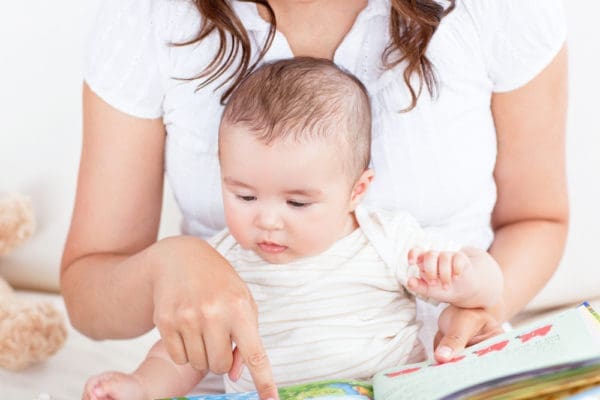
Parents are often awestruck by how much their baby learns and grows in that first year of life. A baby actually starts developing communication skills from the moment they’re born. But did you know you can play a significant role in your child’s development by doing things everyday things like reading, talking and singing?
Research shows the first 5 years of a child’s life are critical for speech and language development because the brain best absorbs language during this period. Reading, talking and singing help grow a child’s vocabulary in more ways than you can imagine and even sets them up for a more successful future. For example, recent studies show children who are read to enter kindergarten with 20,000 words in their vocabulary, compared to 3,000 words for children who are not read to.
This doesn’t have to be complicated. While reading with your child, it’s not what you read that counts – it’s how! Make the story come alive by changing your voice or using sound effects and motions. Point out pictures that match your words. Ask questions. Talk about what you read or even sing parts of the story.
At Health Partners and Park Nicollet, we are passionate about sharing these messages with parents and families every day. We are proud to participate in a national program called Reach Out and Read. The program helps promote brain development by encouraging parents to read to their children. At well-child visits between 6 months and 5 years, children receive a book from their pediatrician or family practitioner who also talks to their parents about the importance of reading.
Parents often ask for specific ideas on what they can do to interact with their child at certain ages. Here are some tips on how to read, talk and sing to your child through those first 5 years.
- Newborn to 12 months old
Newborns quickly begin to recognize important sounds in their environment, such as their parents’ voices. Baby babble is your child’s way of communicating. Respond back in their own language, or talk to in your normal voice about everyday things.
When your baby is experiencing an emotion, name the emotion and continue talking so they learn to associate emotions with words. Try playing a game of peek-a-boo. This simple game teaches your child that you exist, even when they can’t see you.
- 1-2 years old
Daily experiences at this age help determine how your child’s brain cells will form and connect to one another. Let your child play with something textured, like a dry sponge or wicker basket to learn new sensations. Ask them how they feel about it, and name the object for them.
Simple activities like singing your child’s favorite song and encouraging them to sing along with you build vocabulary and communication skills. The more sound children hear, the more they will appreciate language.
- 2-3 years old
Toddlers are learning to explore the world at this stage. Use household objects, like cups, to build towers and have fun knocking them down with your child. You are helping your child explore and discover how the physical world works.
Ask your child questions and encourage them to talk about their observations. Conversations like these help children pay attention to what they see and use their memory.
- 3-4 years old
At this age, children begin to form reason and start building a concept of how and why things work. Listen to their reasoning, and explain why things are the way they are. Show your child how to turn the light switch on and off. Say “on” and “off” and see if they can match your words. This helps kids learn the essential concept of cause and effect.
Kids at this age also love to be silly, so when possible, be silly together. Dance to your favorite song. Shake a leg, wiggle your hips and follow each other’s dance steps.
- 4-5 years old
Begin to mentally challenge your child at this stage. Ask questions throughout the day, and let your child form their own answers. Questions help exercise their working memory. Continue to involve them in everyday activities. When you’re cooking, have your child taste a few grains of salt and sugar, and talk to them about the difference. They are learning to explore their senses at this stage so let them experiment.
By the age of five, your child’s brain will have grown to 90 percent of its adult size! Keep up with their development by incorporating activities that are not only fun, but also educational.
All of these ideas and activities help build your child’s vocabulary and communication skills. Remember the importance of reading, talking and singing with your child every day, at every age!
